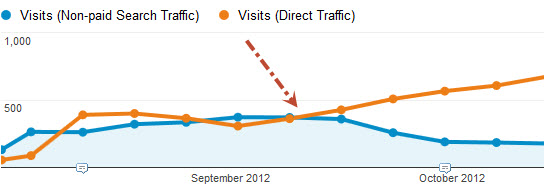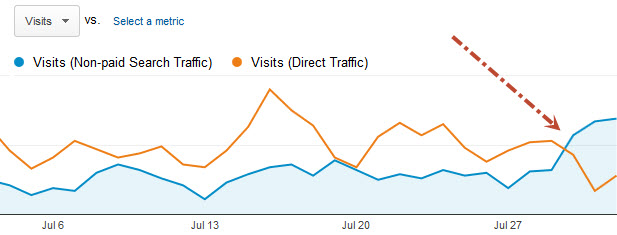In the latter end of 2012 we saw organic search traffic take a rather large dive.
When Apple released iOS6 a strange thing happened. Safari, the browser used, was re-routing Google search traffic through an encrypted version of Google. The result? Organic search traffic could not be attributed to search. Instead all of this traffic was being given to ‘direct’ and no referral data was being passed and that included keywords. This was also reported to have happened in some circumstances with Android 4.0. Therefore, many clients came a calling wondering what happened (see the September 2013 update below).
iOS6 Before (2012):
Today we are pleased to say that this appears to have changed and we are seeing this data coming through as one would expect for both iOS6 and Android in relation to it being labeled Organic. However, I think the keyword data is still held at ransom.
iOS6 After (2013):
UPDATE
Some research provided by the Rimm-Kaufman Group (September 13, 2013) shows that the percentage of (not provided) has grown at a rather fast rate since late July 2013.
The article speculates that part of the cause for this was the collection of data and reporting around iOS6 as discussed in this blog post. Here’s an excerpt:
The timing of the initial not provided jump coincides with the return of some referrers for iOS 6 devices, but this appears to be only one piece of the puzzle. As we’ve noted in previous posts, until the very end of July, no referrer information at all was being passed for around 75% of Google organic searches conducted on iOS 6 devices. Without the referrer, those clicks were viewed as direct site visits by web analytics, rather than organic searches. This had the effect of hiding about 14% of Google organic searches in Q2.
RKG’s latest data suggests that referrers are now missing for only around 40% of iOS 6 Google searches. That translates to about 6-7% more Google organic searches being accurately identified as such. But, since iOS 6 defaults to secure search, the return of those visits should be adding to the not provided bucket.
See the full article by visiting the Merkle website.
As always, we are available to answer any questions you may have!










